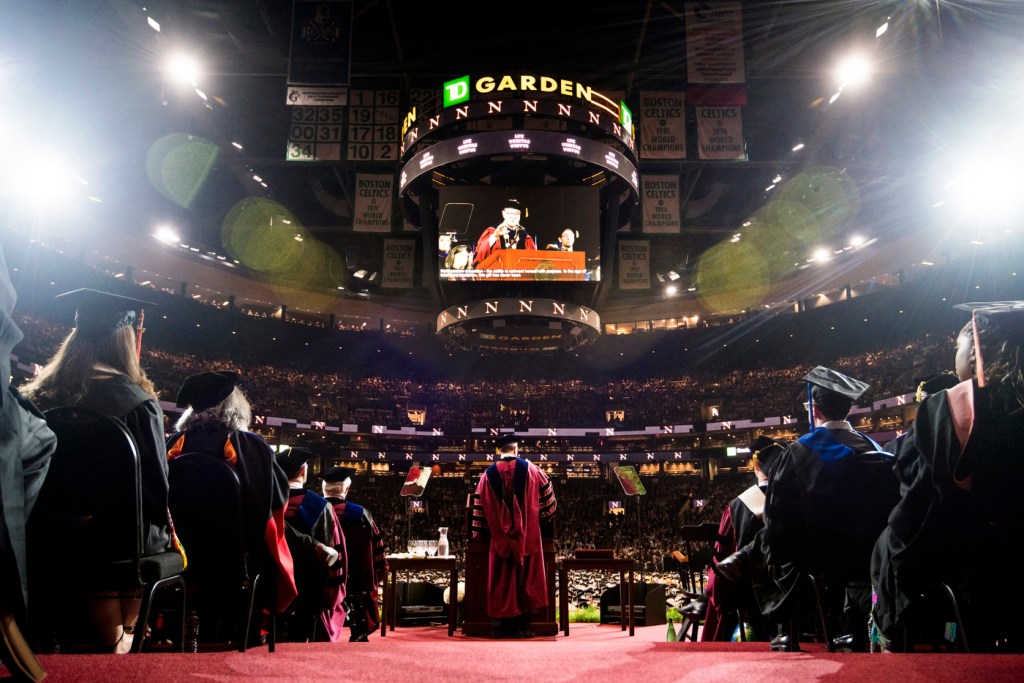Northeastern’s 2019 graduating class encouraged to reinvent, embrace their ‘un-Instagramable selves’

For a few moments during Northeastern’s 2019 undergraduate Commencement ceremony, it was silent in TD Garden. More than 20,000 people—soon-to-be graduates, friends, family, faculty, and staff—appeared to hold their collective breath while Tara Westover filled up the arena with her clear soprano.
Westover, the New York Times bestselling author of Educated, and this year’s Commencement speaker, gave an impromptu performance of a gospel hymn at the end of her address on Friday.
As the final note of her rendition of “How Great Thou Art” hung in the air, the crowd rose to its feet and offered thunderous applause.
Westover’s ability to improvise, her willingness to embrace the challenges and victories before her, and her lifetime of reinvention mirror the qualities the graduates have fostered at Northeastern and will carry into the world with them.
“Reinvention is how we truly progress,” Northeastern President Joseph E. Aoun told more than 4,000 students who received degrees the university’s 117th Commencement exercises. “Reinvention comes through experience, and experience is at the heart of everything we do here at Northeastern.”
Aoun called upon members of the graduating class to use their most human qualities in order to succeed in a world that is continuously being reshaped by rapidly advancing technology.
“In the future of machine intelligence, reinvention gives us humans an edge,” he said. “Machines cannot draw on an experience to reinvent themselves.”
Westover, who grew up in a strict survivalist family in the mountains of Idaho and who has gone on to receive two doctoral degrees—one of which was conferred upon her Friday by Northeastern—exemplifies the sort of experienced-based reinvention Aoun described in his address.
Westover encouraged students to embrace every experience—not just the glamorous ones.
She asked students to pause for a moment to appreciate the parts of themselves that they don’t put online. “I would like to mount a rigorous defense of your boring, internal, book-reading, dishwashing, thought-having life. It’s a concept that I’m going to call ‘the un-Instagramable self,’” Westover said.
It’s an urgent call, she said. There’s a danger, she said, in ignoring the parts of ourselves that don’t make the cut on a highly curated social media account.
“Like most lies that we tell, the worst danger isn’t that others will believe it, but that we will come to believe it ourselves,” Westover said. “That we will come to identify more with our virtual self—who looks so beguiling in photographs, whose life is bright and free and literally filtered. Because what you are saying to yourself is, ‘I’m not good enough the way I am.’”
Rebecca Leeper, who gave the student address Friday, celebrated the diversity of experience among her peers.
Leeper, who will soon begin working as a software engineering consultant at Data Ductus, described a “pivotal moment” in which she and two dozen peers met with the director general of the United Nations. That group, Leeper said, came from 27 countries, spoke 14 languages, and represented more than 20 academic disciplines.
“I’ll never forget the director general smiled at us and said, ‘You can change the state of the world.’ And in that moment,” Leeper said, “I decided I would. But I also knew the only way I could was with a network of people from all over the world who were unafraid and boldly collaborating for change.”
In his charge to the newly minted graduates, Aoun challenged all of them to change the world.
“Our world is beset by challenges. It’s complex beyond reckoning. It’s also beautiful beyond imagination,” he said. “Now the world belongs to you; it’s in your hands,” and, bouncing a beach ball into the crowd, he added, “it’s time for us to go on vacation.”
Honorary degrees
Northeastern conferred honorary degrees upon a group of influential leaders and figures Friday: Westover; Beth Stevens, an associate professor in the Department of Neurology at Harvard Medical School; Maj. Gen. Cedric Wins, who is commanding officer of the United States Army Combat Capabilities Development Command; Amin Khoury, who is chairman and chief executive officer of KLX Energy Services Holdings, Inc. and after whom the Khoury College of Computer Sciences is named; and Eduardo J. Padrón, who is president of Miami Dade College.
For media inquiries, please contact media@northeastern.edu.





